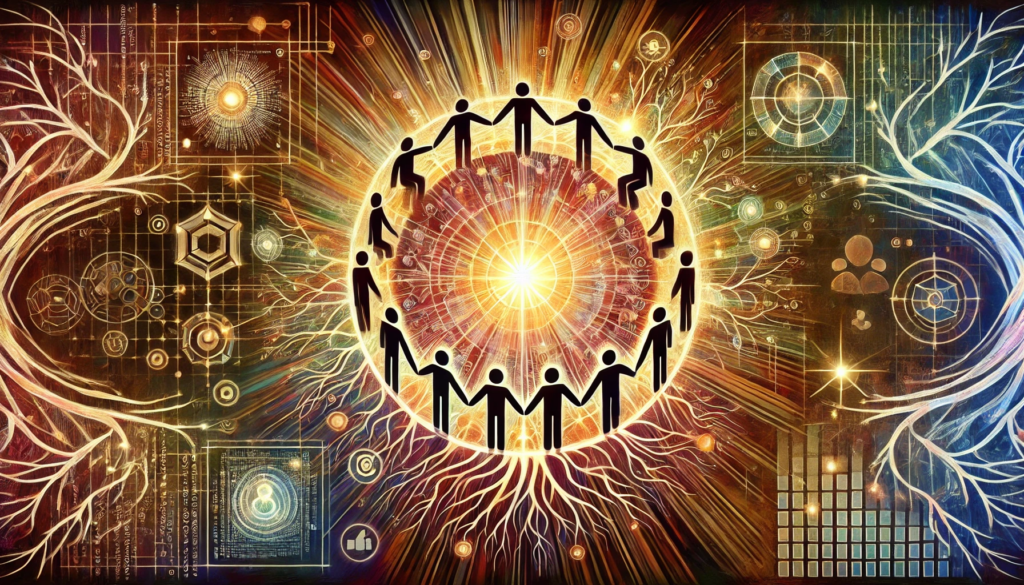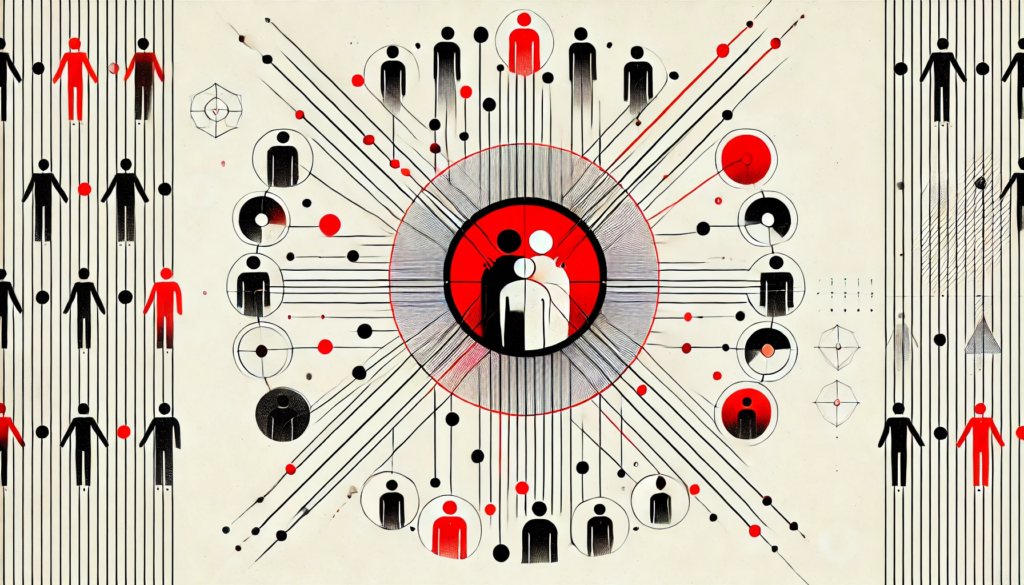
ChatGPT:
Friends: Understanding the Power of Our Most Important Relationships – Robin Dunbar
Robin Dunbar’s Friends: Understanding the Power of Our Most Important Relationships explores the essence of friendship, its evolutionary significance, and its impact on our emotional, physical, and mental well-being. Using scientific research, personal anecdotes, and sociological insights, Dunbar reveals why social bonds are central to our lives and how they shape human survival. His work incorporates biology, psychology, and anthropology to provide a comprehensive look at the role of friendships and how they influence us.
🌟 The Core of Friendship: A Human Necessity
Friendships, Dunbar argues, are far more than optional luxuries; they are evolutionary adaptations critical to survival. From our hunter-gatherer ancestors to the digital age, humans have relied on strong social networks for emotional support, resource sharing, and physical protection. The importance of these bonds is not merely theoretical. Studies show that the absence of meaningful social connections increases the risk of mental health disorders and even shortens lifespans. This evolutionary framework contextualizes the rest of the book.
🧠 Dunbar’s Number: The Limits of Social Bonds
A central concept in the book is “Dunbar’s Number,” which posits that humans can maintain about 150 meaningful relationships at any given time. This limitation stems from cognitive constraints in the human brain and the amount of time required to sustain those connections. While people may interact with thousands on social media platforms, most interactions remain superficial, unable to replicate the depth of real-world bonds.
Within this hierarchy of 150 relationships, Dunbar introduces the concept of tiers. These range from an inner circle of close confidants (typically five individuals) to looser, less emotionally intimate acquaintances. Each tier plays distinct roles, such as providing emotional intimacy, practical help, or casual social interaction.
🌍 Social Media and Friendship in the Digital Age
Dunbar’s book dedicates significant attention to the impact of social media on human connections. While platforms like Facebook and Instagram have expanded our ability to interact with people, they do not substantially alter Dunbar’s Number. Online interactions are often less satisfying and lack the depth required to maintain long-term, emotionally meaningful relationships. Dunbar highlights the dangers of mistaking digital interaction for genuine human connection, emphasizing that virtual friendships can complement but never replace real-life bonds.
💬 Gender and Friendship Styles
One of the most compelling aspects of Dunbar’s analysis is the exploration of gender differences in friendships. Women often prioritize emotional sharing and verbal communication in their friendships, focusing on intimacy and mutual understanding. Men, by contrast, tend to bond through shared activities, such as sports, games, or hobbies. These differing approaches to friendships reflect both biological tendencies and societal influences, yet both genders experience similar emotional benefits from close bonds.
🌱 The Evolution of Friendships Over a Lifetime
Friendships evolve over the course of a person’s life. Childhood friendships are formative, helping individuals develop social skills and emotional intelligence. As people enter adulthood, work friendships and romantic relationships often take center stage, sometimes at the expense of older, platonic ties. However, Dunbar stresses the importance of nurturing lifelong friendships. Maintaining these bonds requires consistent time investment and prioritization, especially in today’s fast-paced world.
🤝 Cultural Perspectives on Friendship
Friendship norms and expectations vary across cultures. Dunbar provides examples from around the world to illustrate how societal norms shape the way people connect. In some cultures, friendships are deeply intertwined with family and community obligations, while in others, they are more individualistic. These cultural differences influence everything from how people interact to the types of support they seek from their friends.
🏃 Health Benefits of Friendship
Dunbar provides compelling evidence that friendships directly impact health. Strong social ties have been shown to reduce stress, improve cardiovascular health, and even enhance immune function. People with close friends tend to live longer, happier lives. Conversely, social isolation has been linked to higher rates of chronic illness, depression, and early mortality. The book underscores that investing in friendships is as crucial for well-being as exercise or a healthy diet.
⏳ The Time and Effort Required
Friendships demand regular attention to thrive. Dunbar compares friendships to a garden: without care and time, they wither. From weekly meetups to daily conversations, maintaining close ties requires commitment. He also notes that neglect often leads to a loss of intimacy, emphasizing that proximity and shared experiences play critical roles in strengthening bonds.
📖 Key Themes and Takeaways
1. Evolutionary Significance
Friendship is a core human trait, evolved to aid survival and foster community cooperation.
2. Hierarchy of Relationships
Humans organize relationships into layers of intimacy, with a small number of deep, close connections and a broader circle of casual acquaintances.
3. Social Media’s Limits
While social media has revolutionized communication, it cannot replace the depth of face-to-face friendships.
4. Health and Longevity
Friendships are as critical to health as diet or exercise, improving both physical and mental well-being.
5. Gender Differences
Men and women approach friendships differently, reflecting biological and cultural factors.
6. Cultural Variability
Friendship norms vary widely, shaped by societal structures and cultural values.
7. Investment is Key
Building and maintaining friendships requires regular time and effort, a challenge in modern, mobile societies.
8. Challenges in Modern Life
Urbanization, job mobility, and technology strain the ability to sustain meaningful friendships.
9. Lifelong Importance
Friendships remain critical at every stage of life, from childhood to old age.
10. Resilience of Bonds
Despite modern challenges, human connection remains resilient, adapting to new mediums and contexts.
💡 Final Thoughts
Robin Dunbar’s Friends is a profound exploration of the central role friendships play in human life. It bridges biology, psychology, and sociology to reveal how social bonds have evolved and why they remain essential in the digital age. The book is both an academic study and a practical guide, encouraging readers to prioritize and nurture their relationships. By understanding the science behind friendships, we can better appreciate their value and work to sustain them in a rapidly changing world.

Quotes from Friends: Understanding the Power of Our Most Important Relationships
1. “Friendships are the single most important factor influencing our health, happiness, and even our longevity.”
• Highlights the profound impact friendships have on our well-being.
2. “Dunbar’s Number limits us to about 150 meaningful relationships, not because we lack the will, but because our brains simply cannot handle more.”
• Explains the cognitive limits of human social capacity.
3. “Social media can expand your circle of acquaintances, but it cannot replace the depth and emotional richness of face-to-face interactions.”
• Reflects on the limitations of digital friendships.
4. “The effort you put into your friendships directly determines the strength and longevity of those bonds.”
• Emphasizes the importance of regular interaction to maintain connections.
5. “Men tend to bond through shared activities, while women often connect through emotional and verbal exchanges.”
• Highlights gender differences in forming and maintaining friendships.
6. “Friendships are not just an emotional luxury; they are a biological necessity for survival.”
• Stresses the evolutionary importance of social networks.
7. “Your closest five friends form the core of your emotional world, shaping your sense of self and well-being.”
• Discusses the central role of the inner circle in Dunbar’s hierarchy.
8. “Loneliness is as harmful to your health as smoking 15 cigarettes a day.”
• A striking comparison to show the physical toll of social isolation.
9. “Cultural differences shape how friendships are formed, but the need for human connection is universal.”
• Reflects on the global variability and constancy of friendships.
10. “Childhood friendships set the foundation for how we connect with others throughout our lives.”
• Explores the lasting impact of early social bonds.
11. “The secret to lasting friendships lies in shared experiences and frequent contact.”
• Advice on maintaining strong social ties.
12. “Friendship is like a garden—it flourishes only if you tend it regularly.”
• A metaphor highlighting the effort required to sustain relationships.
13. “Losing a close friend can feel as devastating as the end of a romantic relationship.”
• Reflects on the emotional weight of friendship loss.
14. “Friendships evolve over time, adapting to new circumstances and priorities.”
• Shows the dynamic nature of relationships.
15. “In modern life, we must be intentional about cultivating friendships amid distractions and busyness.”
• Encourages conscious effort to prioritize social connections.
16. “Workplace friendships not only boost productivity but also improve job satisfaction and mental health.”
• Highlights the significance of professional relationships.
17. “Face-to-face interactions release oxytocin, deepening the emotional bond between friends.”
• Explains the biological benefits of in-person connections.
18. “Friendship isn’t about the quantity of connections, but the quality of the bonds you build.”
• A reminder to focus on meaningful relationships.
19. “As we age, friendships become increasingly vital for emotional and physical health.”
• Discusses the heightened importance of social ties in later life.
20. “Ultimately, our social networks define who we are and the life we lead.”
• A closing reflection on the profound role of friendships.
FAQs: Friends: Understanding the Power of Our Most Important Relationships
Q: What is the main focus of the book?
A: The book explores the science, sociology, and psychology of friendships, emphasizing their evolutionary importance, health benefits, and how they shape our lives.
Q: What is Dunbar’s Number, and why is it significant?
A: Dunbar’s Number is the idea that humans can maintain about 150 meaningful relationships at any given time. It is significant because it explains the cognitive and emotional limits of social bonding.
Q: Does the book address social media’s impact on friendships?
A: Yes, it discusses how social media can expand our network of acquaintances but often fails to provide the depth and emotional connection of face-to-face interactions.
Q: Are there gender differences in how friendships are formed?
A: Yes, the book highlights that women tend to bond through emotional sharing, while men often bond through shared activities or interests.
Q: How does friendship impact physical and mental health?
A: Friendships are shown to lower stress, improve heart health, boost immunity, and even increase life expectancy. Loneliness, on the other hand, can lead to significant health risks.
Q: How do friendships change over a lifetime?
A: Friendships evolve with age, reflecting life stages such as childhood, young adulthood, and old age. The book emphasizes the importance of nurturing friendships throughout life.
Q: What effort is required to maintain friendships?
A: Friendships require regular interaction, shared experiences, and time investment. Neglecting these can weaken the bond over time.
Q: Does the book discuss cultural differences in friendships?
A: Yes, it explores how societal norms influence friendship dynamics worldwide, showing both universal needs and cultural variability.
Q: What role do workplace friendships play?
A: Workplace friendships are shown to improve mental health, job satisfaction, and collaboration, making them crucial in professional environments.
Q: What is the book’s stance on the future of friendships?
A: The book is optimistic but cautions against over-reliance on technology. It stresses the importance of face-to-face interactions and intentional effort to maintain meaningful connections.

Criticism of Friends: Understanding the Power of Our Most Important Relationships by Robin Dunbar
While Friends offers valuable insights into the science of relationships, it has not been free from criticism. Below are some of the key critiques raised by readers and reviewers:
1. Overemphasis on Evolutionary Psychology
Some critics argue that Dunbar relies heavily on evolutionary psychology to explain human behavior, which can sometimes oversimplify the complexity of relationships. By attributing most aspects of friendship to biological evolution, the book may underplay cultural, emotional, and individual variations.
2. Limited Discussion on Modern Challenges
Although the book touches on the impact of social media, some readers feel it does not sufficiently address the challenges of forming and maintaining friendships in a fast-paced, digital world. The discussion on how technology has changed the dynamics of relationships is seen as shallow and underdeveloped.
3. Lack of Practical Applications
While Dunbar provides a wealth of theoretical insights, critics note that the book lacks actionable advice for readers. Those looking for a “how-to” guide to improve or strengthen their friendships may find the book more academic than practical.
4. Repetition of Concepts
Some readers have found that the book tends to repeat ideas, particularly surrounding Dunbar’s Number and the structure of social tiers. This repetition can make the text feel less engaging for those already familiar with these concepts.
5. Western-Centric Perspective
Despite mentioning cultural differences, the book’s examples and case studies are predominantly drawn from Western societies. Critics argue that this limits its scope and applicability to a global audience.
6. Neglect of Conflict and Negative Relationships
The book focuses on the benefits of friendships but does not explore the complexities of conflicts, betrayals, or toxic relationships in depth. This omission leaves a gap in understanding the full spectrum of human social bonds.
7. Overgeneralization
Dunbar’s findings, while rooted in research, sometimes come across as broad generalizations. For example, the discussion on gender differences in friendship styles has been critiqued as reinforcing stereotypes without fully accounting for individual or cultural nuances.
8. Scientific Bias
As a scientist, Dunbar leans heavily on empirical data and biological explanations, which some readers feel lacks emotional depth. Those seeking a more narrative or empathetic exploration of friendships might find the book overly technical.
9. Missed Opportunities on Social Media Analysis
Although the book acknowledges social media’s role in modern relationships, critics feel it misses an opportunity to delve deeper into its psychological and societal effects, especially in younger generations.
10. Dense Writing Style
The writing can be dense and academic at times, which might deter casual readers or those without a background in social sciences. Some critics have suggested that a more accessible tone could have broadened the book’s appeal.
Despite these critiques, Friends remains a highly regarded work for its exploration of the scientific and evolutionary basis of human relationships. However, readers may find its academic approach more suitable for understanding the “why” of friendships rather than the “how” of building and sustaining them.
